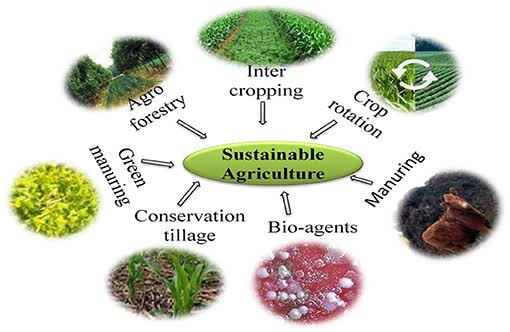Innovative Approaches to Sustainable Agriculture in the 21st Century
Sustainable agriculture has emerged as a critical component for ensuring food security, environmental stewardship, and economic vitality. In today’s rapidly changing world, innovative practices in agriculture are not only transforming the traditional methods but also offering strategic solutions to contemporary challenges.
The Need for Sustainable Agriculture
Modern agriculture faces numerous challenges such as climate change, soil degradation, water scarcity, and the rising demand for healthy, organic produce. In response, sustainable agriculture integrates environmental, economic, and social practices to create resilient farming systems.
Key Drivers of Change
- Environmental Concerns:
- Reducing chemical usage and adopting organic practices.
- Preserving biodiversity and mitigating climate change.
- Economic Factors:
- Enhancing farm profitability through diversified income streams.
- Reducing input costs by implementing resource-efficient practices.
- Social Motivators:
- Meeting the growing consumer demand for sustainable products.
- Promoting community well-being and farmer support networks.
Benefits of Sustainable Agriculture
- Environmental Protection: Enhances soil fertility and reduces pollution.
- Economic Resilience: Increases long-term profitability and reduces risks.
- Social Equity: Provides fair opportunities and improves community health.
Innovative Strategies for Sustainable Agriculture
In order to achieve sustainable agriculture, several innovative strategies have been implemented by farmers and agricultural experts alike.
Strategies and Best Practices
- Precision Farming:
- Utilizes satellite imaging, sensors, and drones to optimize planting, irrigation, and pest control.
- Organic Farming:
- Emphasizes natural pest control, composting, and crop rotation to maintain soil health.
- Agroforestry:
- Integrates trees and shrubs into farming systems to boost biodiversity and reduce erosion.
- Water Conservation Techniques:
- Uses drip irrigation systems and rainwater harvesting to manage scarce water resources.
Bullet Points on Implementation Techniques:
- Adoption of renewable energy sources (solar panels, wind turbines).
- Use of biofertilizers and organic pesticides.
- Integration of traditional knowledge with modern technologies.
- Collaborative networks among farmers to share best practices.
Case Studies and Comparative Analysis
To illustrate the success of these strategies, consider the following comparative table highlighting key performance metrics between conventional and sustainable agriculture.
| Aspect | Conventional Agriculture | Sustainable Agriculture |
|---|---|---|
| Soil Health | Chemical-dependent, declining organic matter | Enhanced fertility through organic composting |
| Water Usage | High and often inefficient usage | Optimized through precision irrigation techniques |
| Crop Yield | Higher short-term yields with risks of long-term depletion | Steady yields with increased resilience over time |
| Environmental Impact | Increased pollution and greenhouse gas emissions | Lower emissions, promotes biodiversity |
| Economic Viability | Dependent on high input costs | Diversified income streams, reduced dependency on chemicals |
Frequently Asked Questions (FAQs)
What exactly is sustainable agriculture?
Sustainable agriculture involves farming practices that work in harmony with nature. It focuses on long-term productivity by enhancing environmental quality, economic profitability, and social equity.
How does precision farming contribute to sustainability?
Precision farming uses technology such as GPS, drones, and sensors to monitor crop health and resource usage. This targeted approach helps reduce waste, lower costs, and minimize environmental damage.
Are organic farming practices viable for large-scale production?
Yes, many large-scale farms are transitioning to organic practices. Although the initial transition can be challenging, the long-term benefits include better soil health, reduced chemical dependency, and improved market demand for organic products.
What role does technology play in sustainable agriculture?
Technology is central to modern sustainable agriculture. It facilitates efficient resource management, real-time monitoring, and data-driven decision-making, which together enhance productivity and reduce environmental impact.
Conclusion
Innovative approaches in sustainable agriculture are reshaping the future of farming. By addressing environmental, economic, and social challenges, these methods promote a balanced ecosystem and resilient food systems. As the global community increasingly prioritizes sustainability, the integration of advanced technologies and traditional practices offers a promising pathway toward a greener and more prosperous future.

Join Us On For Latest Updates For Click Here To Get All Latest Government Jobs And Education News : https://gamezoom.online/ You Can Join Our What’s app Grouphttps://chat.whatsapp.com/CVwROiD9kKSFwq6pnIdQxi Click Here To Join Our Facebook Page To Get All Latest Government Jobs And Education News : https://www.facebook.com/profile.php?id=100085051735597&mibextid=ZbWKwL Download And Get Here all Data Of Your Requirement in One File https://heylink.me/EarnWithSSS/ Join our Facebook page for more details: https://www.facebook.com/profile.php?id=100085051735597&mibextid=ZbWKwL